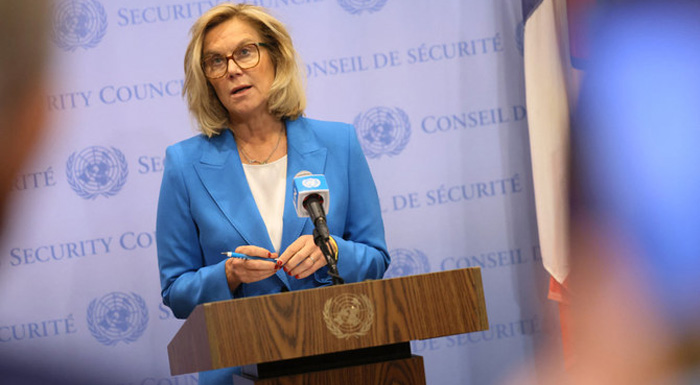Paradigm shift needed to meet massive needs of people in Gaza, UN Security Council hears
The UN said on Wednesday that if it is to avert the threat of famine and meet the massive humanitarian needs of the civilian population in Gaza in a safe and secure manner, a paradigm shift is needed.
This will require scaling up of volumes and distribution of aid, ensuring safety of workers delivering assistance inside the territory, and making a start now on preparations for the reconstruction and recovery process.
Underscoring the fact that there is no substitute for the political will to sustain such work, Sigrid Kaag, the senior humanitarian and reconstruction coordinator for Gaza, echoed repeated calls by UN Secretary-General Antonio Guterres for a ceasefire, the immediate and unconditional release of all hostages held by Hamas, and the unrestricted flow of humanitarian aid to the population of the ravaged enclave.
She also expressed grave concern about a threatened Israeli incursion into the city of Rafah in southern Gaza, which has become the last refuge for more than 1.5 million Palestinians, most of them displaced by fighting in other parts of the territory.
A ground attack “would compound an ongoing humanitarian catastrophe, with consequences for people already displaced and enduring severe hardships and suffering,” she said.
Kaag was appointed by Guterres following the adoption of Security Council Resolution 2720 in December last year, which called on him to task a senior official with “facilitating, coordinating, monitoring and verifying” in Gaza, as appropriate, the humanitarian nature of all humanitarian relief consignments provided through states that are not parties to the conflict.
As she shared her assessments with members of the Security Council on Wednesday, Kaag said Israel continues to reel under the “deep trauma” of the Oct. 7 attacks by Hamas and the uncertainty about the fate of the remaining hostages. Meanwhile more than 34,000 people have been killed in Gaza, tens of thousands injured or maimed, and livelihoods, homes, schools and hospitals have been destroyed, she added.
“The health infrastructure in Gaza has been decimated” and the few hospitals left standing are operating amid severe shortages of supplies and frequent power outages, Kaag said.
“As summer draws near and temperatures rise, communicable diseases threaten to sweep through Gaza. Children, who in every crisis suffer the worst and the most, are deprived of nutrition, protection and education, their futures hanging in the balance.
“The scarcity of food and other essential goods has also led to a breakdown in civil order and the gradual unraveling of the social fabric in Gaza.”
Effective humanitarian operations cannot be reduced “to counting trucks,” Kaag said as she emphasized the important need for humanitarian agencies to be able to transport consignments of food, medicine and other supplies safely using all possible routes and crossings. In this context, she said, the work of the UN Relief and Works Agency for Palestine Refugees is “pivotal.”
She added: “UNRWA is irreplaceable and indispensable as a humanitarian lifeline and must be allowed to deliver on its mandate.”
The agency has been facing a severe crisis since Israeli authorities alleged in January that a dozen of its workers participated in the Oct. 7 attacks. A report published this week following an independent review of UNRWA revealed that Israel has yet to provide any proof in support of the allegations, and noted that for the past 13 years, authorities in Tel Aviv failed to raise any concerns about individuals named on staffing lists the agency shared with them.
This month, in response to international pressure, Israel made several commitments intended to improve the delivery of humanitarian supplies to Gaza, including scaling up of volumes of aid, the opening of additional border-crossing points and for longer hours, repairs to a damaged water pipeline, and permission for bakeries in northern and central Gaza to resume making bread.
However, given the scope of the destruction and the extent of the human suffering in the territory, Kaag said “further definitive and urgent steps are needed.” These include repairs to roads, timely provision of authorization for aid convoys, arrangements for evacuations of hospital patients and casualties, and more-effective mechanisms for protecting humanitarian workers on the ground.
She also spoke of efforts to streamline the delivery of aid shipments to Gaza from Jordan, Egypt and Cyprus, with the UN proposing an inspection, monitoring and verification unit be established on the Palestinian side of border with Egypt at Rafah.
However, she said that although work to build a floating port and pier on the Gaza shore continues to advance, a maritime corridor from Cyprus “can never be a substitute for delivery by land. Land routes are the only way to bring in the bulk of supplies needed.”
The extent of the destruction and the devastating effects of the war on the entire population call for an ambitious, comprehensive plan of support, with the level of investments this requires, Kaag said. The scale of the investment required is clearly revealed by the need to “rebuild and repair more than 84 percent of destroyed health facilities” and for “the return of an entire student population to school while educational facilities have been destroyed.”
She added: “The Palestinian Authority has a critical role to play in Gaza. The international community must work toward enabling its return, strengthen its governance capacity, and prepare it to reassume its responsibilities in Gaza.
“All efforts toward early recovery and reconstruction also need the participation of Palestinian civil society. Fostering a conducive environment to reestablish the commercial sector in Gaza and the engagement of the Palestinian business community and its investors are equally important.”


Comments are closed.